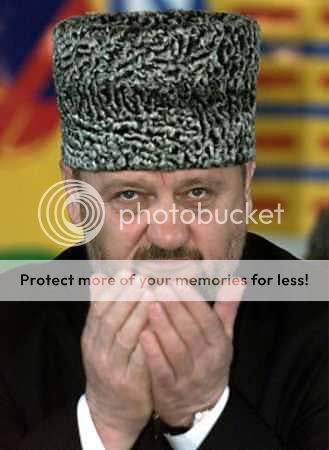
By Oleg Shchedrov
MOSCOW (Reuters) - Assassinated Chechen President Akhmad Kadyrov will be buried in his home village on Monday leaving a yawning power vacuum that his Kremlin patrons will find hard to fill. The 52-year-old former Muslim cleric, pillar of a future Chechnya in Moscow's eyes but a turncoat for Chechen rebels, died on Sunday when a bomb exploded at a ceremony in Grozny to celebrate the 1945 victory over Nazi Germany.
Six others were killed, including a Reuters reporter, an eight-year-old girl, a close aide of Kadyrov and two bodyguards.
More than 50 people were injured, including the commander of Russian forces in the region, General Valery Baranov.
Kadyrov, who was elected Chechen president with heavy Kremlin help last year, will be buried in the southern village of Tsentoroi, the base of his powerful clan.
"Kadyrov's death is a heavy blow," Russian parliamentary deputy Ramazan Abdulatipov, who in 1999 negotiated the defection of Kadyrov to the Kremlin camp, told Ekho Moskvy radio.
"Kadyrov's death has left a political vacuum in Chechnya," he said. "It turns out that there is no one to pick up his banner."
In October 1999 Vladimir Putin, a prime minister soon to become Russian president, sent troops to end an effective independence won by Chechnya in a 1994-1996 war with Russia.
"There was a need for a new Chechen leader," Abdulatipov said. "It was clear the region would not accept a leader fully loyal to Moscow from the start and Kadyrov was the ideal choice."
DIRECT RULE
During the first Chechnya war Kadyrov rose to a position of mufti, the spiritual head of the Muslim community, and announced a holy war Jihad against Russia. But later he broke with other rebel leaders, blaming them for over-reliance on foreign help.
He openly sided with the Kremlin and was soon appointed head of the Moscow-installed administration by Putin, who strived to minimize Russia's military involvement in Chechnya and encourage Chechens to solve Chechen problems.
Kadyrov proved to be an ideal instrument. He stayed loyal without seeming slavish and managed to persuade many rebel commanders and rank-and-file fighters to lay down their arms.
His son Ramzan created a powerful military force which dealt with unrepentant rebels, in many cases replacing Russian forces.
Initial reaction from Putin's camp to Kadyrov's death showed that he would find it hard to continue attempts to let Chechens run Chechnya.
Lyubov Sliska, first deputy parliamentary speaker from the pro-Kremlin United Russia party, told Interfax agency she favored introducing direct presidential rule in Chechnya. Nationalists from the Rodina (Motherland) bloc echoed this.
"I would advise the federal leadership to introduce direct presidential rule in Chechnya and appoint a plenipotentiary envoy there," Rodina leader Dmitry Rogozin said.
But even if Putin resists the temptation to return to direct rule in Chechnya, which proved ineffective in the past, he is unlikely to turn up easily a suitable replacement for Kadyrov.
During the October Chechen presidential election, which Kadyrov won by a landslide, any figure who could become a competitor -- including popular general AslaMbek Aslakhanov, former Russian parliamentary speaker Ruslan Khasbulatov and businessman Malik Saidullayev -- was forced out of the race.
No comments:
Post a Comment